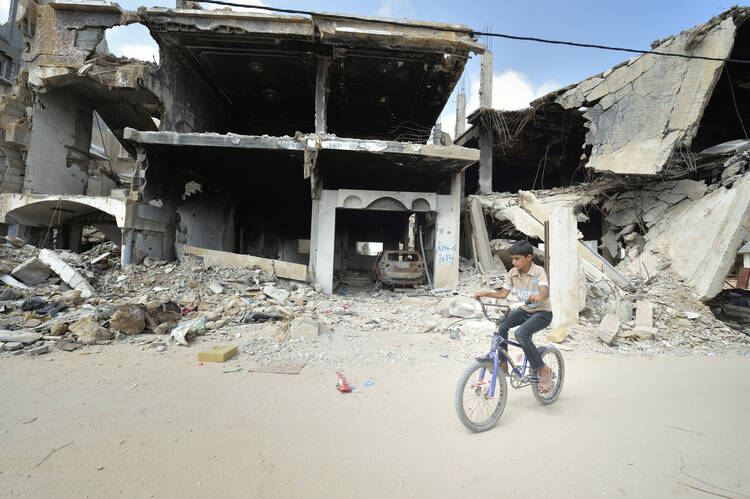One year after war with Israel turned daily life in Gaza into a nightmare, a Catholic priest there said the situation in the besieged Palestinian territory has deteriorated even further. “Compared with a year ago, we’re worse off. Although a truce stopped the war, the blockade of Gaza by Israel has grown more intense. This has direct consequences for the population,” said the Rev. Jorge Hernández, pastor of the Catholic parish of Holy Family in Gaza City.
The priest said the war also served as a recruiting tool for Hamas, the Islamic party that has controlled Gaza since 2007. “The war generated new activism throughout Gaza. The number of people willing to fight has multiplied, whether on behalf of Hamas or Islamic Jihad or the Salafists, and now even with the Islamic State. Despite that, the great majority of the people of Gaza are not aligned with one party or another. They just want to live a normal life,” Father Hernández, an Argentine missionary of the Institute of the Incarnate Word, explained.
The 50-day war cost the lives of more than 2,250 Palestinians, 65 percent of whom were civilians, according to a report in June from a U.N. investigation. The report said “the scale of the devastation was unprecedented.” It said the Israeli military launched more than 6,000 airstrikes, 14,500 tank shells and 45,000 artillery shells into Gaza between July 7 and Aug. 26, 2014.
The war also “caused immense distress and disruption to the lives of Israeli civilians,” the United Nations said, reporting that nearly 4,900 rockets and more than 1,700 mortars were fired by Palestinian armed groups during that period. Sixty-six Israeli soldiers were killed, along with six civilians.
Fawzi Abu Jame’a had finally finished building his family’s dream home just eight months before the beginning of the conflict. Jame’a’s house soon fell under a barrage of bombs, mortars and weaponized bulldozers that pushed through the rubble ahead of advancing Israeli ground troops.
But now he is back home. Sort of. His house remains a pile of rubble on which he still owes almost $2,000. But in a vacant space beside it, he has moved into a house built by Catholic Relief Services, the international relief and development arm of the U.S. Catholic bishops.
C.R.S. is building hundreds of what it calls “transitional houses” throughout Gaza, where more than 10,000 houses were completely destroyed in last year’s conflict. They are designed to last at least five years, after which residents hope they will be able to move into a more permanent dwelling. “It’s an excellent house, and with a window it’s not too hot. I feel fortunate, as a lot of people here still have nothing,” said Jame’a, who has already added a patio, kitchen cupboards and several other improvements.
Deya Al Baba, a C.R.S. shelter specialist, said getting victims of war out of crowded shelters and into decent housing is a critical contribution to helping Gaza begin to recover.
“Palestinians in Gaza consider their house as their paradise. They spend most of their lives building a new house to provide adequate and dignified space for their children,” he said. “There are no green spaces to let their children play outside, so the house becomes a place for the children to play, learn, cook, eat, watch television, all the normal things of life. So when they lose their homes, they are heartbroken and depressed. Their home is their life, their dream.”








